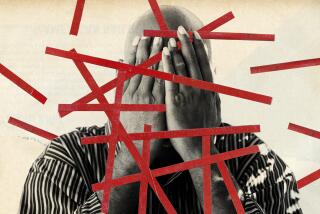Suicide Try at NBC Is Man’s 2nd of Week, Police Say
- Share via
Pascal Kareb, who threatened to jump from the Peacock sign atop NBC Studios in Burbank on Thursday, also tried to leap to his death Monday from the 20th floor of a Century City tower, police said.
After the first incident, police pulled the 30-year-old Frenchman to safety. Psychiatrists evaluated him for three days and then released him. Hours after he was free, he had climbed to the top of the NBC sign, 150 feet above the ground.
Once police saved him a second time, Kareb was taken for observation to Olive View Medical Center in Sylmar, where hospital officials and representatives from the French Consulate said they were working Friday to have him released and flown back to France.
In cases such as Kareb’s, hospital psychiatrists say, they must rely on what the patient tells them in judging whether that patient should be held longer than 72 hours.
“If you seem to have plausible plans and insist on leaving and speak appropriately, we would not have grounds to hold you,” said Dr. Boyd Krout, associate chairman of the department of psychiatry at Harbor-UCLA Medical Center, where Kareb was taken after his first alleged suicide attempt.
Hearing or Release
After 72 hours, if doctors still consider the patient to be helpless or a danger to himself or others, either the case must be brought to a hearing or the patient must be released.
Psychiatrists at Harbor-UCLA and Olive View said most of the patients at their institutions who are committed for 72-hour holds are kept for an extra 14 days.
A few, though, like Kareb, are released, they said.
“It’s generally rare not to hold a person beyond the 72 hours,” said Krout.
Although he and other personnel would not talk specifically about Kareb’s case, Krout said that, in general, the patients who are released are “people who are not out of it, who are able to say, ‘I know who I am and where I am,’ or who say, ‘Yes, I did try to hurt myself and gee, I’m not going to do it again.’ ”
After the initial tests and therapy, the behavior of a patient can change, said Ron Klein, a psychologist who is director of the Crisis Management Center in Van Nuys.
“It’s not uncommon for people to present differently after three days,” said Klein.
Although this could be the result of a variable mental disorder that may reappear later or of a conscious deception on the part of the patient, he said, the hospital must accept the situation.
Asked whether there have been other patients who, once released, repeated the behavior that put them in the hospital in the first place, Krout said, “It is rare . . . that there would be a repetition of this sort.”
Dr. Joseph McKenna, a psychiatrist at Olive View familiar with the Kareb case, said there is a fine line between protecting the safety of a patient and society and infringing on the patients’ civil rights. Even though there can sometimes be mistakes, a hospital should lean toward respecting the patient’s rights, he said.
“In the spirit of the law, if someone appears to be better and agrees to receive treatment as an outpatient, I tend to go with that,” he said. “In a free society, you have to take a few risks.”
More to Read
Sign up for Essential California
The most important California stories and recommendations in your inbox every morning.
You may occasionally receive promotional content from the Los Angeles Times.













